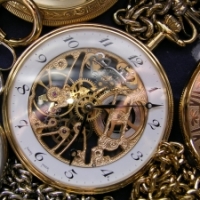The Strange Matter of How We Perceive Time

On the treadmill at the gym, I enter the settings for duration, speed, and incline. How nice it would be to also have a setting to adjust the time so that I could do thirty minutes of huffing and puffing in only ten.
For better or worse, we’re confined to a planet where thirty minutes takes no more or less than thirty minutes. But even though we can’t do much about the passage of time—and it seems like we’ll never have enough of it—it’s intriguing to consider how we experience it.
For example, time seems to move a lot faster when we’re busy than when we’re not. Like most things, this view doesn’t always hold. For example, in experiments involving listening to songs, people judged songs that ended unexpectedly early to be shorter in duration. Normally, though, time seems to flow faster when we’re enjoying ourselves than when we’re bored, uninterested, or forced to listen to someone’s endless blah-blah-blah.
Of course, what that time is filled with also matters. Recall meetings you’ve had with crabby, blaming customers and meetings of the same duration with cooperative, supportive customers. Which felt longer? And of course, a week spent in anticipation of a long-awaited vacation seems to take longer than a week waiting for a root canal. Plus, the vacation ends all too quickly, while the root canal drags on and on.
Another interesting finding about the perception of time is that people tend to overestimate the number of hours they’ve worked when compared with counts derived from detailed time-use studies. In addition, the longer people have worked, the more they seem to exaggerate. It’s not known, though, whether this tendency to exaggerate comes from the perception of the hours worked or a need to impress others with how hard they’ve worked.
Clearly, we experience time subjectively. Furthermore, our perception of time is distorted by all sorts of things, such as fatigue, emotion, eye movements, altered states of consciousness, and life-threatening situations. Whereas we have specialized sensory receptors for sight, hearing, touch, smell, and taste, we have no specific receptors solely dedicated to recording the passage of time. Our brain circuits somehow control our sense of time, and theories keep emerging about how it all works.
One theory is that the brain has some sort of internal clock that enables it to keep track of time. Another is that physical changes to the cells of the brain help to monitor the passage of time. A third is that we have a biological stopwatch that makes use of several brain mechanisms, including the ones that control memory, regulate metabolism, and process sensory inputs. Which theory will prove to be the right one? Only time will tell.

